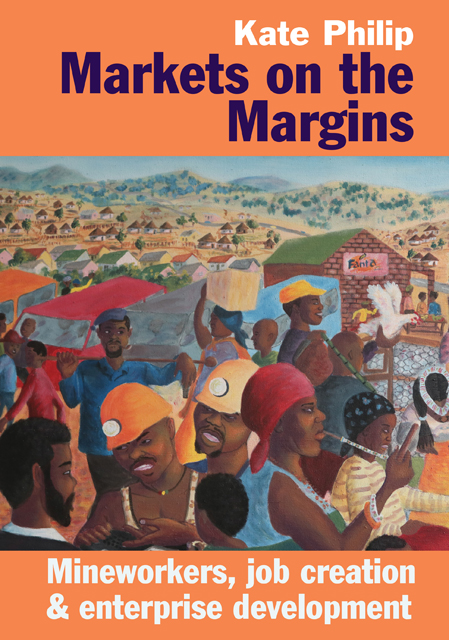Book contents
- Frontmatter
- Contents
- List of Illustrations
- Preface
- Acknowledgements
- Abbreviations
- 1 Introduction: Setting the scene
- 2 The 1987 Mineworkers Strike
- 3 Conflict in the Transkei
- 4 Power Struggles in Lesotho
- 5 Co-ops Capture the Imagination
- 6 The NUM Co-op Programme
- 7 Challenges of Democratic Ownership & Control
- 8 Rethinking Degeneration in Co-op Theory
- 9 The Mineworkers Development Agency’s Development Centre Strategy
- 10 Small Enterprise: In the shadow of the core economy
- 11 A New Enterprise Development Paradigm
- 12 Market Development – or a New ‘Anti-Politics Machine’?
- 13 Breaking into Higher-value Markets in the Craft Sector
- 14 Marula: Product innovation & value chains
- 15 Implications for Enterprise Development Strategy
- 16 If Markets are Social Constructs, how Might we Construct them Differently?
- Select Bibliography
- Index
4 - Power Struggles in Lesotho
Published online by Cambridge University Press: 20 January 2023
- Frontmatter
- Contents
- List of Illustrations
- Preface
- Acknowledgements
- Abbreviations
- 1 Introduction: Setting the scene
- 2 The 1987 Mineworkers Strike
- 3 Conflict in the Transkei
- 4 Power Struggles in Lesotho
- 5 Co-ops Capture the Imagination
- 6 The NUM Co-op Programme
- 7 Challenges of Democratic Ownership & Control
- 8 Rethinking Degeneration in Co-op Theory
- 9 The Mineworkers Development Agency’s Development Centre Strategy
- 10 Small Enterprise: In the shadow of the core economy
- 11 A New Enterprise Development Paradigm
- 12 Market Development – or a New ‘Anti-Politics Machine’?
- 13 Breaking into Higher-value Markets in the Craft Sector
- 14 Marula: Product innovation & value chains
- 15 Implications for Enterprise Development Strategy
- 16 If Markets are Social Constructs, how Might we Construct them Differently?
- Select Bibliography
- Index
Summary
South Africa’s mining industry drew workers from labour-sending areas across southern Africa, but the small mountain Kingdom of Lesotho had become particularly dependent on such migrancy, with the large cohort of Basotho mineworkers playing an active role in the development of the National Union of Mineworkers (NUM). They were hard hit by the dismissals following the 1987 strike and, while the post-strike struggles described in the previous chapter were playing out in the Transkei, an analogous process was unfolding in Lesotho.
Lesotho was not always dependent on migrancy. Instead, when gold was first discovered in South Africa, Lesotho became known as the granary of the goldfields, increasing its agricultural output in response to the associated rise in demand. This changed when South Africa imposed new borders in 1912, pushing Lesotho further up the mountains and transferring vast swathes of productive agricultural land from Lesotho into South Africa’s Orange Free State.
With Lesotho largely forced out of South Africa’s agricultural markets, its people became increasingly integrated into the labour market instead. The 1986 census found that nearly half the working male population of Lesotho worked on South Africa’s mines; in 1988, mining remittances contributed to 62 per cent of Lesotho’s gross national product, dropping to just 18 per cent over the next ten years (Hassan 2002, p. 3). Lesotho also has its own complex political history, securing independence from Britain in 1966 to become the Kingdom of Lesotho. Two main parties competed for power. However, when, in 1970, the Basotho Congress Party (BCP) won the elections on a progressive and antimonarchist ticket, the ruling Basotho National Party (BNP) annulled the election and declared a state of emergency. The BNP ruled for the next sixteen years, banning the opposition and forcing its leaders into exile or into the mountains, from where they fought a low-key guerrilla war (Gay and Hall 2000, p. 7).
This did not stop massive international aid flowing into Lesotho. A case study of a World Bank funded development project in Lesotho in the period 1975–84 is provided in James Ferguson’s classic ethnographic study, The Anti-Politics Machine. Ferguson describes the aid-funded development apparatus as ‘an anti-politics machine, depoliticizing everything it touches, everywhere whisking political realities out of sight, all the while performing, almost unnoticed, its own pre-eminently political operation of expanding state power’ (Ferguson 1990, p. xv).
- Type
- Chapter
- Information
- Markets on the MarginsMineworkers, Job Creation and Enterprise Development, pp. 35 - 44Publisher: Boydell & BrewerPrint publication year: 2018

